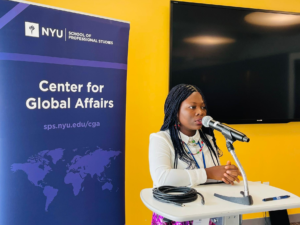Save for the bird chorus and echoing footfalls, the journey to the farmland was mostly silent. Alongside five siblings, Oluwadamilola Akintewe joined her parents in the misty Saturday air to till ridges of maize and vegetables until late afternoon. Eight years old at the time, Oluwadamilola recalls the sheer drudgery of churning up the red soil with a clunky hoe until late afternoon.
Her parents were hard-working farmers who took pride in their labour and wanted to pass on this devotion to their children.
“He didn’t have properties for us to inherit, but the only thing he could offer us was an education, and he would do his best to offer it to us,” Oluwadamilola says of her father.
To get his daughter better schooling, Oluwadamilola’s father sent her to live with his relatives in a semi-urban part of the state. Two years afterward, her parents arranged for their 14-year-old daughter to stay alone. She was joined by her younger sister later.
Each holiday drew her back to her family home in Odigbo, in rural Ondo, where she resumed the work on the farm and sold beans and garri every evening.
This rural upbringing would draw Oluwadamilola to later establish two organisations—Project Rebirth and Forbidden Topics—committed to fighting gender-based violence and economic disempowerment among women in conflict-prone areas.
Upon completing secondary school, she didn’t proceed to university immediately because her parents couldn’t afford the tuition costs. After two years of staying at home, she received a scholarship through her former school principal, who believed in her potential.
In 2016, Oluwadamilola enrolled for law at the Adekunle Ajasin University, where she would finish among the top ten best students in her class. Although she had met many different industrious women growing up, her coursework in law unravelled new layers about the harrowing state of womanhood in Nigeria.
One research paper she came upon in her second year left an enduring impression on her. According to the paper, “over 60% of poor Nigerians are women,” because they lack a source of personal income. Rather than laziness, she thought that the problem reflected systemic economic inequality.
“Give a Nigerian woman ₦5,000,” she says, “and she’ll find a way to multiply it,” she argues.
Oluwadamilola thought long and hard about this in the months that followed, eventually coming up with an initiative. Project Rebirth, launched in 2018, started as a human capital development initiative to support women with vocational skills training that could be immediately harnessed for income.
For three years, Project Rebirth thrived off volunteering. The training was hosted by students who devoted several hours weekly to share knowledge on such skills as sewing, bead-making and baking. Even the training venue had been leased for free.
But by 2021, another problem reared its head. As she discovered, capital was just as important as the skills. Based on this epiphany, Project Rebirth evolved into a microfinancing and capacity-building outlet for women in vulnerable communities.
A large proportion of women are excluded from formal credit markets, a gap worsened by limited education, amongst other factors. As a result, 58.9% of businesses owned by women struggle to access loans, depending mostly on personal savings, family or friends to fund their ventures.
In 2022, Oluwadamilola applied to the One Young World Summit in Manchester, where she highlighted these odds, pitching the idea of structured microfinancing for women, especially in IDP camps.

Thus came her first major funding pool, which enabled Project Rebirth to disburse small loans—ranging from ₦100,000 to ₦200,000—alongside its training workshops.
Given that women and children constitute a majority of internally displaced persons (IDPs) in Nigeria, Project Rebirth lends support to women displaced by insurgency or communal violence and camped in IDP shelters across Abuja, Nasarawa, Borno, and Benue States.
The 100% repayment miracle
Compared with the hawkish methods by other loan providers, In just three years of microfinancing, Project Rebirth deploys a less violent approach, which has seen an unprecedented “100% repayment rate,” Oluwadamilola says.
She explains that she and her team collaborate with trusted local leaders to vet loan seekers and track progress among beneficiaries.
“There was no need to shout. If we want to check their progress report,” she says, “I just give one of the community leaders a call.”
Loans are typically offered to women who can meet the repayment schedules—small-scale traders, farmers, artisans—and linked to a mentor for practical guidance.
In the case of an unprofitable business year, beneficiaries can renegotiate repayment plans without any fuss.
Rebuilding lives
With more than 500 beneficiaries, Project Rebirth has loaned out nearly ₦25 million to over 500 businesses managed by women who previously relied on government aid.
Not only has the initiative eased businesses for many, Oluwadamilola explains, but it has also helped to piece together the lives of these women after so many years of being displaced.
Forbidden Topics
One evening in 2018, on her way to campus, Oluwadamilola was attacked with a machete by an unidentified assailant. When she reported the incident to the school authorities, the response left her shuddered. “What were you wearing?” they asked.
Drawing on her experience, Oluwadamilola started Forbidden Topics to encourage survivors of gender-based violence share their stories without fear. It runs both virtual and physical sessions, once helping a young woman win a court battle against her attacker.
In recent years, Forbidden Topics has expanded its mission to address technology-facilitated gender-based violence, launching the She Village Fellowship. This programme grounds Nigerian undergraduates in advocacy training to fight online harassment, non-consensual pornography and cyber abuse. Undergraduates receive small grants to conduct training in their own various institutions.
In 2024, Oluwadamilola received the Diana Legacy Award from the Prince of Wales, a moment she describes as “surreal.” Along with a feature on the Financial Times, she has also been honoured by the African Union for her grassroots approach to rebuilding women’s livelihoods
Still, without sustainable revenue for expansion, Project Rebirth has kept to only four states in the country. Applications for grants are returned with well-written rejections.
Still Oluwadamilola’s work continues to glean recognition. “I’m joining Brown University’s Center for Human Rights as a fellow, working on women’s rights for the next six months,” she says excitedly.
Looking back on her impact on the women in IDP camps, she can’t but notice how much it compares with her girlhood days, cultivating her parents’ farm until it became thick with fresh vegetables and maize.
Oluwadamilola Akintewe grew up in rural Nigeria, working on her parents' farm and valuing education as the key to a better future. She pursued a law degree, motivated by the systemic economic inequalities facing Nigerian women. This led her to launch Project Rebirth in 2018, which initially provided vocational training but later evolved into a microfinancing initiative. This project offered loans and training to women in vulnerable communities, achieving a 100% repayment rate over three years by focusing on community trust and support.
Additionally, Oluwadamilola founded Forbidden Topics to address and combat gender-based violence, following a personal assault experience that highlighted society's victim-blaming tendencies. This initiative provides a platform for survivors to share their stories and includes advocacy training against technology-facilitated gender violence. Despite financial constraints limiting Project Rebirth's expansion to only four states, Oluwadamilola's efforts have gained significant recognition, including a Diana Legacy Award and an upcoming fellowship at Brown University's Center for Human Rights. Her work continues to empower displaced women in Nigeria, reminiscent of her early life experiences on the farm.






